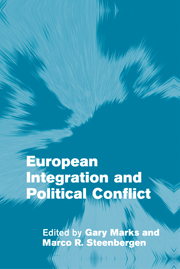Book contents
- Frontmatter
- Contents
- List of figures
- List of tables
- List of contributors
- Preface
- Introduction: Models of political conflict in the European Union
- Part I Citizens
- Part II Political parties
- 5 Defining the EU political space: an empirical study of the European election manifestos, 1979–1999
- 6 Does left/right structure party positions on European integration?
- 7 Political competition in the European Parliament: evidence from roll call and survey analyses
- 8 Contesting Europe? The salience of European integration as a party issue
- Part III Groups
- References
- Index
8 - Contesting Europe? The salience of European integration as a party issue
Published online by Cambridge University Press: 22 September 2009
- Frontmatter
- Contents
- List of figures
- List of tables
- List of contributors
- Preface
- Introduction: Models of political conflict in the European Union
- Part I Citizens
- Part II Political parties
- 5 Defining the EU political space: an empirical study of the European election manifestos, 1979–1999
- 6 Does left/right structure party positions on European integration?
- 7 Political competition in the European Parliament: evidence from roll call and survey analyses
- 8 Contesting Europe? The salience of European integration as a party issue
- Part III Groups
- References
- Index
Summary
The ongoing process of integration in Europe has fundamentally altered the political environment in which the political parties of the EU member states find themselves. European integration has produced new political issues, which cannot always be easily accommodated into existing cleavage structures, as the preceding chapters reveal. It has also changed the political opportunity structure – parties may play these new issues up or they may play them down. In this chapter, we analyze why some national political parties have stressed European integration, while others have refrained from doing so.
An analysis of the salience of European integration at the party level is important for several reasons. First, it speaks directly to the topic of contestation. A prerequisite for contestation is that political actors are willing to debate an issue – there is a willingness to give the issue a modicum of salience. To what extent do political parties show such willingness?
Second, salience is also critical for understanding representation in the EU. Van der Eijk and Franklin (1996; this volume; see also Reif and Schmitt 1980) have observed that European elections are rarely about the scope and nature of integration, even though at the level of the electorate a contestation potential exists. This may be a contributing factor to the so-called democratic deficit of the EU. The lack of European content in European elections may be due to an unwillingness or inability of parties to raise integration above a critical salience threshold.
- Type
- Chapter
- Information
- European Integration and Political Conflict , pp. 165 - 192Publisher: Cambridge University PressPrint publication year: 2004
- 115
- Cited by



